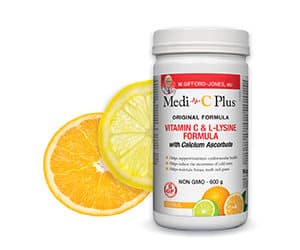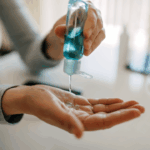
Women’s Voice magazine has done a remarkable job educating its readers about the causes and consequences of stress. Every day women, men, and even children experience the negative impact that chronic stress can have on physical, mental, and emotional health. Eating a balanced diet, incorporating physical movement, and in some cases, seeking support, provide significant support during stress. The use of specific natural health products can also help offset the impact of stress, so let’s review a few key supplements that can help us stay calm in a crisis.
5-HTP
Serotonin is a key neurotransmitter that influences mood, appetite, sleep habits, and pain tolerance. The body normally converts the amino acid tryptophan into 5-HTP and then into serotonin. Low serotonin levels are associated with health concerns such as mood disorders, obesity, fibromyalgia, poor sleep quality, and migraines. Supplemental 5-HTP, often derived from the seeds of the African plant Griffonia simplicifolia, provides a more direct route to improving serotonin levels. 5-HTP helps promote healthy mood balance and improve sleep difficulties. It has also been shown to help prevent recurrent migraines and reduce headache intensity, and relieve chronic pain and fatigue associated with fibromyalgia. Speak to your health care practitioner before using 5-HTP as it may not be suitable to use with other agents that increase serotonin. The typical dosage of 5-HTP depends on the condition of concern. In regards to mood balance, 50–100 mg three times daily with food is suggested, while 100–200 mg, 30–45 minutes before bedtime may be recommended to improve sleep quality.
L-Theanine
L-theanine is an amino acid found in tea leaves, such as green and oolong tea, or in supplement form. L-theanine has been shown to have anti-stress effects, specifically helping to reduce anxiety, improve sleep, and enhance attention and focus. These benefits are related to its ability to increase alpha waves in the brain leading to an increasingly relaxed and alert mental state. L-theanine also supports mood by regulating essential brain chemicals such as dopamine, serotonin, and GABA. The typical adult dosage recommendation is between 100 mg up to 400 mg per day, or as directed by a health care practitioner. L-theanine can typically be taken during the day (as it does not cause daytime drowsiness), or before bed.
Melatonin
Melatonin is a naturally occurring hormone that maintains our body’s natural sleep-wake cycle. As evening approaches and daylight diminishes, there is a slow release of melatonin into the bloodstream. Melatonin peaks in the middle of the night to maintain sleep naturally and declines by early morning, signalling the body to awaken. Stress, jet lag, and aging, can disrupt our melatonin production and, ultimately, our sleep cycles. Melatonin supplements may be helpful under these circumstances by reducing the time it takes to fall asleep, increasing total sleep time, and improving overall sleep quality. Melatonin should be taken about 1 hour before bedtime and dosing is highly individual, generally ranging from 1–5 mg. Adults and children should start with a low dose, for example, 0.5–1 mg, to observe any particular adverse effects such as nightmares. The dosage can gradually be increased if needed, depending on your overall response.
Specific supplements can help manage the impact that stress will have on the body and mind. Discover if ingredients such as L-THEANINE, GABA, 5-HTP, or MELATONIN, or a combination of these, are suitable for you.
SOMETIMES STRESS IS INEVITABLE, SO ALWAYS MAKE SURE TO FIND WAYS YOU CAN KEEP BEING YOUR BEST SELF.
GABA
GABA (gamma-aminobutyric acid) is a vital amino acid that acts as an inhibitory brain chemical, helping to reduce the activity of brain neurons and the central nervous system. In doing so, GABA helps increase relaxation, reduce anxiety, improve sleep, and even relieve pain. Many commonly used anti-anxiety and sedative drugs interact with GABA receptors. One particular supplement form of GABA is known as Pharma GABA®, a natural form manufactured via a fermentation process that uses Lactobacillus hilgardii – the bacteria used to ferment vegetables in the preparation of kimchi (a traditional Korean dish). Since GABA helps increase alpha brain waves, and decrease beta brain waves, it helps promote a relaxed state with better mental focus and alertness. The typical dosage recommendation is 100–200 mg up to three times daily, or as directed by a health care practitioner.














